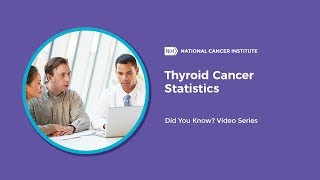
| Cancer Information Highlights | ||
| From the National Cancer Institute | ||
| Updating you about cancer causes, prevention, screening, treatment, coping, and more | ||
| New from NCI | ||
 | Thyroid Cancer Statistics video Cancer of the thyroid gland is highly treatable and can usually be cured. Learn more about thyroid cancer by watching this video. | |
 | Donating Your Tissue for Research video Learn about tissue donation and why it is important by watching this video. | |
 | Treating Cancer without Harming the Heart Some cancer treatments may damage the heart. Researchers from the fields of oncology and cardiology are working to find ways to prevent, manage, and maybe even reverse these side effects. | |
| With Immunotherapy, Glimmers of Progress against Glioblastoma Researchers who study brain cancer are optimistic about immunotherapy's prospects for improving treatment for this aggressive form of brain cancer. | ||
| Childhood Non-Hodgkin Lymphoma (NHL) Our revised PDQ summary includes more complete descriptions of the major types of childhood NHL, updated lists of the tests used to diagnose and stage the disease, new treatments being used, and treatments that are being tested in clinical trials. | ||
| New Drug for Melanoma A new summary about the drug cobimetinib. It was recently approved by the Food and Drug Administration (FDA) to treat melanoma that has a certain mutation and cannot be removed by surgery or has metastasized. | ||
| New Drug for Multiple Myeloma A new summary about the drug daratumumab. It was recently approved by the FDA to treat multiple myeloma in patients who have already received at least three other types of treatment. | ||
| New Drug for Non-Small Cell Lung Cancer A new summary about the drug osimertinib. It was recently approved by the FDA to treat non-small cell lung cancer in patients whose tumors have a certain mutation and have already been treated with a similar drug. | ||






















.png)









No hay comentarios:
Publicar un comentario